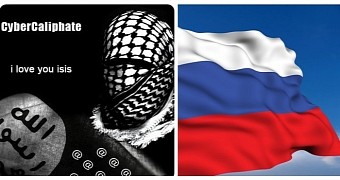The hacking division associated with ISIS (Islamic State of Iraq and Syria) extremist rebels Cyber Caliphate has been hammering Russian online resources since autumn last year, posting messages related to their cause.
The modus operandi of the hackers is to breach websites, deface them and share their deed via social media channels.
Multiple groups carry out ISIS-related activities
Researchers at Moscow-based cyber-crime prevention company Group-IB have taken the track of the attackers and observed their methods.
According to them, apart from Cyber Caliphate, there are three other groups (Team System Dz, FallaGa Team and Global Islamic Caliphate) that have more than 40 individuals engaged in ISIS-related activities.
These groups are often seen claiming responsibility for defacing a large number of websites all over the world. Since the beginning of the year, FallaGa Team has altered over 300 sites belonging to businesses and organizations in France alone, following the Charlie Hebdo incident.
The list of their targets does not appear to follow a specific pattern as the websites attacked belong to entities activating in different sectors. Group-IB has identified several banks, construction companies, plants and governmental institutions being affected by the attacks.
They add that among the victims there are even lyceums and scientific centers, such as the North Urals Local History Museum, “Mitischy” city portal and Lyceum no.5 in Ufa.
Attacks could escalate to more sensitive targets
“Despite our good protection from very complicated, but predictable threats, I think, Russian Internet security services and Russian companies shouldn't undervalue ISIL capabilities, as their attacks are out of any logic and aimed to the maximum social resonance,” says Ilya Sachkov, CEO and co-founder of the company.
He also added that a larger number of cyber-divisions inside ISIS organization, combined with training and fanaticism, could lead to more sophisticated and damaging operations with an impact on critical infrastructure and industrial systems.
At a meeting with members of the Safety Council, President Vladimir Putin said that Russia was ready to defend against ISIS.
Monitoring the activity of Cyber Caliphate was triggered by the group’s hijacking of US Central Command’s Twitter and YouTube profiles and distributing ISIS propaganda as well as info on airstrikes against the Islamic State.
In a more recent incident, another group called the Islamic State Hacking Division (ISHD) published personal details of 100 American soldiers and instigated ISIS supporters in the US to take action against them.

 14 DAY TRIAL //
14 DAY TRIAL //